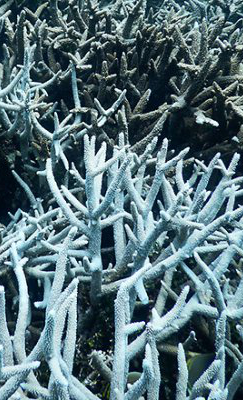Heatwaves harm coral structure
 New research shows marine heatwaves are a much bigger threat to coral reefs than previously thought.
New research shows marine heatwaves are a much bigger threat to coral reefs than previously thought.
Experts at the University of New South Wales (UNSW) have revealed a previously unrecognised impact of climate change on coral reefs.
The report suggests that marine heatwaves do not just affect creatures that live inside coral, but that their skeletons start to decay within weeks, too.
This means that the 3D coral framework which provides home to many other animals on the reef is also at risk.
Severe marine heatwaves not only trigger well-known bleaching events – a breakdown of symbiosis – but in fact can lead to heat-induced mortality of the coral animal itself.
“Until now, we have described coral bleaching as an event where the symbiotic relationship between coral and its microbes breaks down and corals lose their main source of nutrition, and the coral can die if the symbiosis is not restored,” says Associate Professor Tracy Ainsworth from UNSW.
“But what we are now seeing is that severe marine heatwave events can have a far more severe impact than coral bleaching: the water temperatures are so warm that the coral animal doesn’t bleach – in terms of a loss of its symbiosis – the animal dies and its underlying skeleton is all that remains.”
“We find that the skeleton is immediately overgrown by rapid growth of algae and bacteria,” says co-author Associate Professor Bill Leggat.
“We were able to study the consequences of this process of rapid colonisation using CT scanning of the coral skeleton – as would be used in medical imaging. We show that this process is devastating not just for the animal tissue, but also for the skeleton that is left behind, which is rapidly eroded and weakened.”
The research team used bio-optical techniques to visualise and study the rapid transition in the coral microbiome.
With this technique, the team could see microbial communities go from symbionts to harmful coral skeleton-dissolvers.
Adopting the technique more broadly could help understand how this process occurs on reefs globally.
“We anticipate that heatwave mortality events, and rapid reef decay, will become more frequent as the intensity of marine heatwaves increase,” the researchers say.
Dr Scott Heron from James Cook University says this rapid dissolving of coral skeletons following severe heatwaves had not been known until now.
“Climate scientists talk about ‘unknown unknowns’ – impacts that we haven’t anticipated from existing knowledge and experience. This discovery fits into this category. As we begin now to understand this impact, the question is how many more of these ‘unknown unknowns’ might there still be that could bring faster and greater damage to coral reefs from climate change,” he said.
A/Prof Ainsworth says that the team hopes that this research will motivate the public to tell decision makers how important coral reefs are to them, and voice the immediate need to preserve coral reefs now.
“Across the globe coral reefs are still a source of inspiration and awe of the natural world, as well as being critically important to the communities that rely upon them. Given that the degradation of coral reefs will result in the collapse of ecosystem services that sustain over half a billion people, we urgently need actions both globally and locally that protect and conserve these truly wonderful places.”







 Print
Print